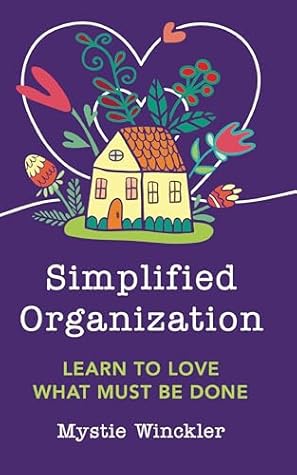More on this book
Community
Kindle Notes & Highlights
Read between
February 14 - May 22, 2025
Regular review is the absolute key to maintaining a sense of organization. We have to look at our lists to make them happen, and that looking over is called a review. A weekly review sharpens our intuitive focus on important projects as we deal with the flood of new input and potential distractions coming at us the rest of the week.
We must be both savvy and disciplined enough to know the value of sacrificing fake relaxation for the truly refreshing and rejuvenating option. As moms, we’re functioning as managers of our homes. If we want to be effective, we will take the time to keep up-to-date and on top of our game. We can’t do that moment by moment, so we must carve out fifteen minutes or so at the end of the week to pull back and process.
Routines don’t have to be perfect to be helpful The way you keep your house, the way you organize your time, the care you take in your personal appearance, the things you spend your money on, all speak loudly about what you believe. The beauty of thy peace shines forth in an ordered life. A disordered life speaks loudly of disorder in the soul. —Elisabeth Elliot, Let Me Be a Woman
We’re in this together. We’re all managing busy, active households and trying to keep up with the life being lived. The goal isn’t for our house to be in a perfect state, but for us to keep everything and everyone functioning and moving forward. Sometimes that happens less consistently, but we stick with it, not trying to maintain company-clean every minute of every day.
Housework is never done. We make the checkmark, but the task returns the very next day or week—maybe even the same day or hour. Our goal can’t be to “finish” the housework or “complete” our chores, but rather to put in the repetitions, to do the time.
Rather than reaching for finality and perfection, our goal ought to be regularity, a daily “good enough.” The daily good enough— not the daily best or daily perfect end result—then becomes our routine.
If “clean house” means “functioning house,” however, we have a useful definition. Our homes are tools to be used for the real goal of loving our families and serving the people God brings through our door as well as the people we meet when we go out the door. The goal is not to have a home that is clean for its own sake. A home that is clean but serving no one is barren, wasted, useless.
Every homemaker needs to decide what “reasonably clean” is for her house. We each must find our balance between “my household can function smoothly” and “cleaning is stressing me out because it’s undone every time a child walks through a room.” We don’t want to be a frazzled mess because everything is in shambles or because other people live in our house. A clean house exists for the good of people. The point is to keep our homes useful and functioning, not pristine. Our routines are how we execute that dance.
The best way to build routines is to connect them to the existing patterns of our day. By acknowledging our current reality we can slowly build up routines that fit our family’s situation and needs.
It takes time and effort to implement a new routine, even when it is tied to an existing routine. Once established, however, the routine decreases the amount of time and effort needed to maintain it. That’s the glory of routines.
A household run by routine isn’t like a clock, never missing a beat and always exact. But routines do allow us to run a household with less mental, physical, and emotional effort. Making decisions at every juncture, for every need that arises, is exhausting and overwhelming. Routines remove the need to rehash every detail in our minds in order to decide what to do next.
Decision fatigue is real, and routines are the first line of defense for homemakers. So much of the work we do will need to be done again that we might as well make it routine, regular, and repetitive, saving our decision-making energy for the situations that develop on the fly.
Instead of starting with the “best” plan, we should begin with the minimum plan that will make the most difference. We should ask ourselves, What is the bare minimum needed to keep things running? We can always build from there as we improve, and, just as importantly, we can return to the minimum viable option when (not if) life goes haywire.


